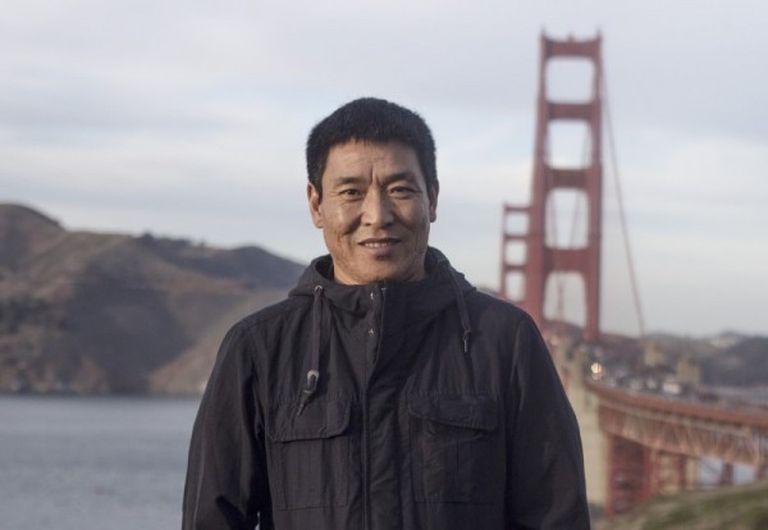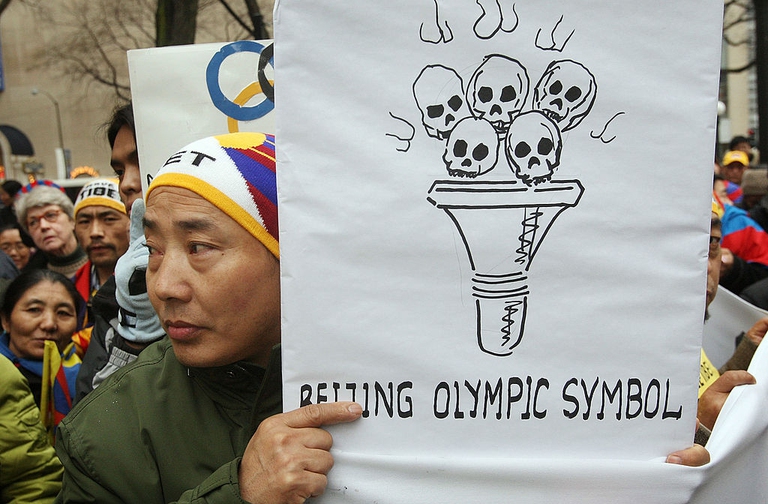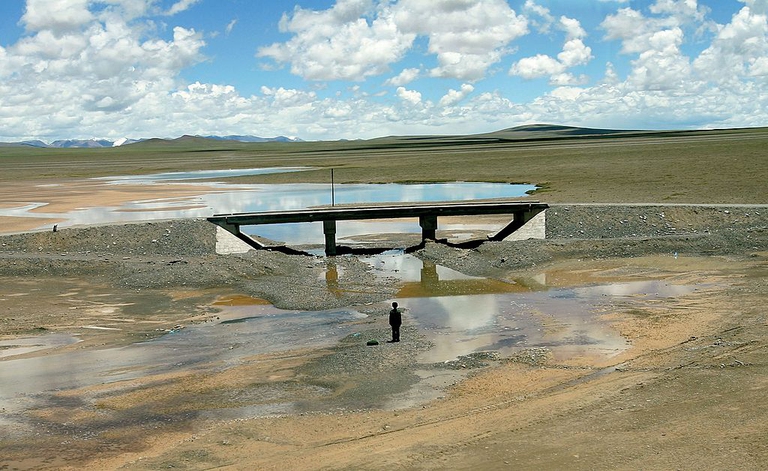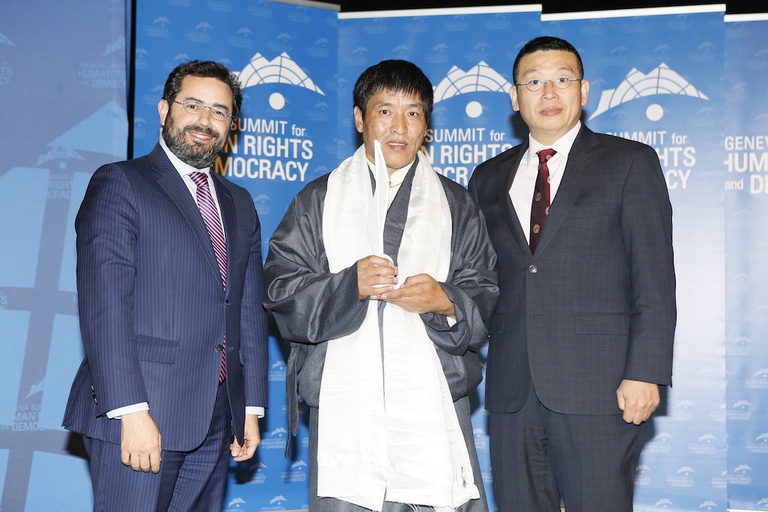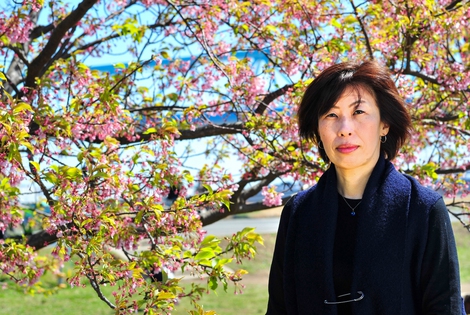
Three people putting the protection of the planet before themselves. Three powerful stories from Latin America, the deadliest region for environmental activists.
Filmmaker Dhondup Wangchen was imprisoned by the Chinese government for his documentary condemning the Tibetan condition. He tells us how he continues to fight for his people even after the traumas faced.
“A strong inclination towards compassion exists in Tibetan culture. It’s widespread and natural. We consider our enemy a teacher because they push us to be more profoundly compassionate and distance ourselves from destructive feelings such as rage”. These are the words of Dhondup Wangchen, the filmmaker who was imprisoned in a Chinese jail for six years because of his documentary denouncing the Tibetan condition, Leaving Fear Behind, released around the time of the 2008 Beijing Olympics. In confirmation of his words, 150 Tibetans have immolated themselves since 2009, to give a voice to their people. “They didn’t hurt anyone else, they burnt themselves alive like human torches to condemn the injustice we’ve been facing for over 60 years. Unfortunately, their gesture was useless”.
Wangchen is 45 years old, he was born in Amdo, a region annexed to the Chinese province of Qinghai after the invasion of independent Tibet in 1949. For his documentary, he travelled to the remotest areas of the Tibetan plateau and collected more than 100 interviews with men and women who accepted to talk to him and be filmed, conscious of the risks. “Many of them paid a great price for exposing themselves, such as Golog Jigme, my assistant, who is a monk and also my friend.”
[vimeo url=”https://vimeo.com/50220285″]Video Cano Cristales[/vimeo]
The full version of Leaving Fear Behind has never been released, the one currently available online, though still a harsh critique, is watered down to 24 minutes and about 10 interviews. “I was freed in 2014, the Beijing Olympics were a distant memory by then and publishing the original version would have only threatened people’s safety once again – Wangchen says –. Time had run out, it no longer made sense.” In December 2017, the filmmaker was finally able to reunite with his wife and four children in San Francisco, in the United States, where he was given asylum as a political refugee after a risky escape from China and a perilous journey across continents.
We met him in Zurich with Norzin Lhamo-Ritsatsang, in charge of Filming for Tibet, a small production house that curated the documentary and also supports the Tibet Film Festival in collaboration with the Tibetan Youth Association in Europe. The festival took place this year in the Swiss city in September, in Dharamshala, India, seat of the Tibetan government in exile, in October and in London, UK, the following month. Wangchen’s gaze is low and focused, moving rapidly from one side of the room to the other. In addition to what is published here, he tells us some details he wishes us not to report.
Why did you decide to shoot a documentary on the Olympics?
In order to win the bid for the games, Beijing made promises it never kept: a greater respect for human rights and more autonomy for the Tibetan people. It claimed the Dalai Lama would be allowed to go back to Tibet, which is my people’s greatest wish. The government had to deliver a reassuring and peaceful version of reality to the world, seeing as all eyes were looking its way. The truth is that exactly the opposite took place and reporting on it was important: the Chinese government’s repression was even greater.
How did you end up in prison?
Large protests took place in Tibet in 2008. On the 26th of March I was participating in one of these and was arrested and interrogated by the secret police. The documentary was shown at a later date, as the Olympics were starting, both in Beijing and Delhi (in India, ed.), only to foreign journalists and diplomats. The trial was a farce, I was granted no rights, my lawyer was greatly pressured and in the end I was convicted. In truth, I thought the sentence was going to be even harsher.
How was life in prison?
I was a slave. I worked between 12 and 16 hours with just one meal a day for six years, seven days a week, non-stop, for 365 days a year. The prisons are factories used for the worst jobs and in the worst conditions: we sewed uniforms for the Afghan, Iranian and Iraqi militaries. Each prison manufactures something different, the most complex and hazardous production lines, such as those for plastic and minerals, are performed in prisons. There are more than a thousand prisons in China with over a thousand inmates each; an enormous workforce that is exploited without limitations.
What happened once you were set free?
Former inmates are always kept under surveillance. I knew that people very close to me, people from within my circle, were tasked with checking on me and reporting everything I did. Furthermore, I had to warn the authorities every time I intended to go somewhere. I moved to my sister’s house but I wasn’t sure I was going to survive, even outside prison.
Anyone who leaves prison is left with serious physical or mental traumas due to the terrible abuse they’ve been submitted to. I needed periodic medical checks that were continuously denied by the Chinese authorities, who ignored the international appeals made by the United States and some European countries. During that time I decided to film my life as a former inmate, in order to leave a testimony if things ended badly.
What was your life like before being imprisoned?
I moved from Amdo to Lhasa (capital of the Tibetan Autonomous Region, ruled by China, ed.) in 1992. There I met activists, former prisoners, torture victims and came into close contact with every type of injustice and abuse. It was clear to everyone: anything we did could lead us to being imprisoned in the total absence of human rights. Today I think of all the people who are still in this condition. Like Tashi Wangchuk, sentenced to five years for protecting and spreading the Tibetan language, as well the many activists committed to defending the planet and environment.
What is the main concern of the Tibetan environmental movement?
The protests tackle various issues like mining, mass deforestation and indiscriminate land grabbing as well as confiscation of livestock from nomads and farmers. Tibet is full of minerals, including gold. The Chinese government has intensified extraction with negative environmental impacts such as irreversibly polluting rivers and aquifers, on top of further impoverishing the economies of exploited areas.
Furthermore, very high demand for wood from China has caused the cutting of more than half of the forests, disrupting vital natural equilibriums. For example, the Yangtze River flooded in 1998 killing more than 3000 people. Later studies showed that the main cause of the inundation was the deforestation of the Yangtze valley, especially in the Tibetan area.
What do you wish for the future?
My only wish is to continue my efforts for the Tibetan cause. I don’t intend to stop. I certainly need to get used to the United States, learn the language and find a job, but I’m confident I can now live as a free man in a free country.
“To many Tibetans, Wangchen’s work has allowed the truth of Chinese violations in Tibet to reach the rest of the world.”—@yangjianli001, presenting our Courage Award to Tibetan filmmaker Dhondup Wangchen, who escaped Chinese surveillance following 6 years in prison. #FreeTibet pic.twitter.com/uvn4b6tiRJ
— The Geneva Summit (@GenevaSummit) 26 marzo 2019
Last November, Wangchen finally accepted the prize he was awarded back in 2012 while he was still in prison: the International Press Freedom Award given by the Committee to Protect Journalists, an NGO that works to promote the rights of reporters around the world. In March of this year he also received the prestigious Courage Award during the eleventh edition of the Geneva Summit for Human Rights and Democracy.
During our interview in Zurich’s train station, many people from the Tibetan community recognise and approach him to shake his hand. Wangchen is friendly and welcomes everyone with a smile, though he doesn’t like being the centre of attention: “I talk about my experience only to highlight and condemn what is happening to the Tibetan people”. Overcoming his natural shyness, he counts on other people’s support and the fact that his story may be passed on through us, in the hope that it may reach far and wide.
Siamo anche su WhatsApp. Segui il canale ufficiale LifeGate per restare aggiornata, aggiornato sulle ultime notizie e sulle nostre attività.
![]()
Quest'opera è distribuita con Licenza Creative Commons Attribuzione - Non commerciale - Non opere derivate 4.0 Internazionale.
Three people putting the protection of the planet before themselves. Three powerful stories from Latin America, the deadliest region for environmental activists.
Influential scientist, activist and author Vandana Shiva fights to protect biological and cultural diversity, and against GMOs.
Kimiko Hirata has blocked 13 new coal plants in Japan, but she hasn’t done it alone. The 2021 Goldman Prize winner tells us about her movement.
The Goldman Environmental Prize, the “green Nobel Prize”, is awarded annually to extraordinary activists fighting for the well-being of the planet.
We talk to Shaama Sandooyea, activist and marine biologist from Mauritius onboard Greenpeace’s Arctic Sunrise ship in the heart of the Indian Ocean.
Arrested for supporting farmers. The alarming detention of Disha Ravi, a 22-year-old Indian activist at the fore of the Fridays for Future movement.
Water defender Eugene Simonov’s mission is to protect rivers and their biodiversity along the borders of Russia, China and Mongolia.
Chibeze Ezekiel, winner of the 2020 Goldman Environmental Prize for Africa, is fighting to guide new generations towards a renewable future.
Leydy Pech, winner of the 2020 Goldman Environmental Prize for North America, is the beekeeper who defended Mexican Maya land against the agro-industry.
